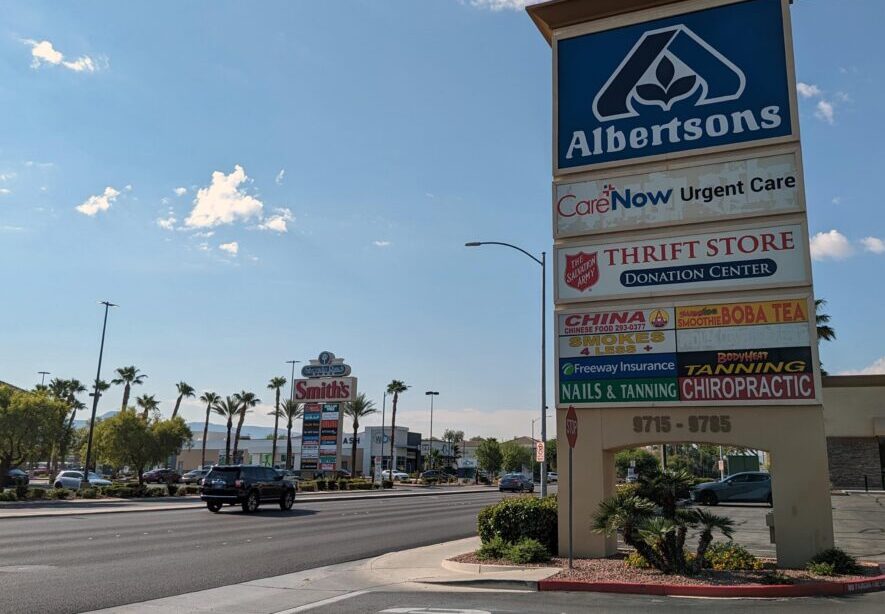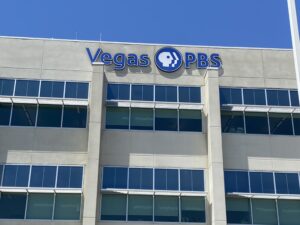7:25
News Story
Nevada AG office investigating potential impact of proposed supermarket supermerger
At the intersection of Maryland Parkway and Silverado Ranch Boulevard in Las Vegas sits both an Albertsons and a Smith’s Food & Drug. Their close proximity to one another means residents in the area can easily frequent both in search of preferred food brands or better deals.
But in due time these rivals may be one and the same.
Smith’s Cincinnati-based parent company, Kroger, has proposed buying Albertsons for $24.6 billion in a deal they hope to close early next year. That deal, which will be subject to regulatory approval by the Federal Trade Commission, is drawing criticism and concerns from elected officials, antitrust advocates and one of the country’s largest private sector unions.
Nevada Attorney General Aaron Ford this week launched a series of public “listening sessions” to gather thoughts and opinions on the proposed merger, which has the potential to impact thousands of jobs, dozens of grocery stores, and the price and availability of food across the state.
Kroger is the largest dedicated grocery chain in the United States. In Nevada, the company operates 46 stores (as Smith’s) and employs 5,729 people, according to a fact sheet on its corporate website.
The company routinely appears near the top of the list of Nevada employers with the most full-time employees eligible for Medicaid. The state reported that 1,263 Smith’s employees, along with 1,405 of their dependents, were enrolled in Medicaid in 2022.
Albertsons is the country’s second largest dedicated grocery chain. In Nevada, the company operates under the brands Albertsons, Safeway and Vons.
Both companies also operate gas stations and pharmacies inside or adjacent to their grocery stores. Those too could be impacted by the merger.
Kroger leaders have said the merger will help it compete against Walmart. The retail behemoth commands one fifth of the market share, according to the consumer research firm Numerator, which looked at total dollars spent on U.S. grocers during the 12-month period in July 2022, a few months before proposed merger announcement in October 2022.
Kroger has the second largest market share at 9.9% — less than half of Walmart.
Kroger and Albertsons together would account for 16% of the market — still solidly behind Walmart.
Critics believe the merger will reduce competition and lead to price increases for consumers whose wallets are still reeling from recent high rates of inflation. They also believe it could also put people out of work.
The United Food and Commercial Workers International Union (UFCW), which represents 1.3 million workers across the U.S. and Canada, came out in strong opposition to the merger.
“Mergers pose a serious threat to the livelihoods of our members and we must act to confront them,” said UFCW International President Marc Perrone in a May statement.
UFCW Local 711 represents 7,000 workers across Nevada and Utah. Local 711 President Michael Gittings, who along with several union members attended the first of Ford’s listening sessions, said the union is particularly concerned about forced divestitures.
Nine years ago, nearly 150 grocery stores, including seven in Southern Nevada, were sold to Haggen, a Washington grocery chain, as a condition of a merger between Albertsons and Safeway, which at that time owned Vons. The divestment was designed to preserve competition in local markets, but just one year later, Haggen declared bankruptcy, leading to store closures and layoffs.
Gittings said the union was able to get most of the affected employees rehired by their former companies, but the ordeal is a reminder of what can go wrong in these types of deals.
“We think the FTC needs to take a hard look at how they evaluate these things and not just have a knee jerk reaction,” he said. “Follow what’s happened in the past because most workers feel that was mishandled by the FTC nine years ago.”
Diane Irwin, who has worked at grocery stores for just shy of four decades, told Ford she has survived multiple mergers, including the 1998 acquisition of Lucky Stores by Albertsons.
“We were told, if it’s Lucky’s, it will stay Lucky people (and) Albertsons would be Albertsons,” she recalled. “Then I walked in one day and didn’t know anybody. They changed, like instantly. They didn’t say it was going to happen. A lot of people got hurt. A lot of people got put to part time. A lot of people ended up leaving… A lot of them got laid off.”
Irwin said she and her coworkers are worried that any Albertsons located across the street from a Smith’s will be sold to a third company that could be hostile toward unions.
“That is a rumor that has been going around for a while and it’s starting to upset people,” she said. “It’s not right. You’re playing with people’s lives.”
Some AGs taking legal actions
Kroger in an SEC filing earlier this year reported that 16 states and the District of Columbia “are reviewing the merger under applicable state and federal antitrust laws and have been provided waivers by the company and Kroger to coordinate with the FTC.”
Several attorneys general have been outspoken in their criticism and some have already taken legal action to try and block the merger. That includes attorneys general in California, Illinois and Washington.
Nevada has not been involved in any of those attempts, and Attorney General Aaron Ford emphasized during his first listening session that his office has not yet taken a position. The office could decide to formally oppose the merger and file a lawsuit in an attempt to block it. Or it could try to strike a deal with the company that includes commitments on things like job retention or philanthropic endeavors.
The latter is the path the office took in 2019 when T-Mobile merged with Sprint.
While Ford has not taken a position on the proposed Kroger-Albertsons merger, at least one other state official has.
Nevada State Treasurer Zach Conine on Wednesday joined counterparts from Colorado, Delaware, Maine, Massachusetts, New Mexico and Washington in signing a letter urging the FTC to oppose the merger. That letter was coordinated by For the Long Term, a network of state, county and local treasurers, comptrollers and auditors focused on addressing the financial risks of climate change, racial inequity, and other issues.
The treasurers stated their “primary concern is the reduction in wages that would occur as a result of the merger.” They cited Economic Policy Institute (EPI) estimates that the merger could bring a total loss of $334 million in wages for 746,000 grocery store workers in more than 50 metropolitan areas.
“The ramifications of these wage reductions extend beyond individual workers and their ability to sustain themselves and their families, they would also have broader consequences for the economies of our states and municipalities,” the letter reads.
The state treasurers also raised the concern that consolidation of the market could lead to the creation or growth of food deserts: “Beyond the wage and cost impacts of the merger, the creation of food deserts will not only impact the health of workers in our states but raise costs for their families as well, as they have to travel to obtain groceries.”
A group of Democratic secretaries of state penned a separate letter to the FTC in opposition to the merger. Democratic Secretary of State Cisco Aguilar was not among the signers.
At the local level, the Clark County Commission in July unanimously approved a resolution urging grocery store companies to retain workers during acquisitions and maintain their existing working conditions, wage rates, hours and schedules. While not binding, the UFCW-championed resolution was clearly directed at Kroger and Albertsons, mentioning them by name.
“I think it’s important to let the companies know that we are watching,” said Commissioner Tick Segerblom, who sponsored the resolution, “and we do hope that they treat Las Vegas fairly, in particular the 6,000 union members that work there.”
Additional sessions, including ones held in the evening, are expected to be added. Nevadans can also weigh in via an online survey, which is available in English and Spanish.
Our stories may be republished online or in print under Creative Commons license CC BY-NC-ND 4.0. We ask that you edit only for style or to shorten, provide proper attribution and link to our website. AP and Getty images may not be republished. Please see our republishing guidelines for use of any other photos and graphics.




